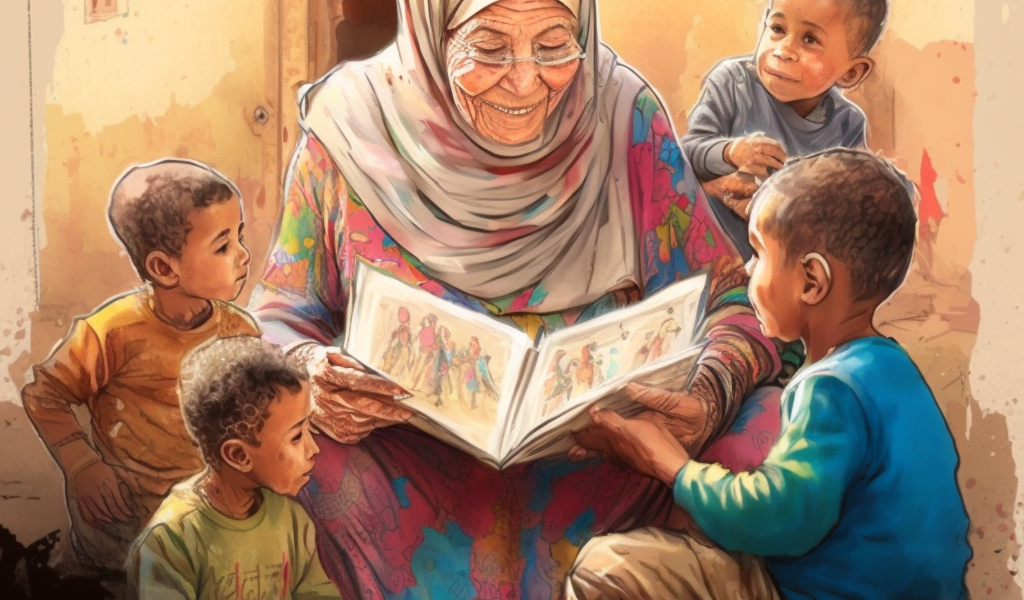Opening the Pandora Box
“Let’s Tell a Story”
Storytelling is universal and is as ancient as humankind. Before there was writing, there was storytelling. Throughout history, it has been used to entertain, to inform, and to promulgate cultural traditions and values.
Storytelling is not just about telling a story. It is a ritual through which a fantastic world and all its characters are brought to life. The storyteller opens a door that needs to be carefully closed after the story is told. This is why in many cultures there is a set of rules that needs to be respected when telling a story.
To our Moroccan friends out there: have you ever wondered why your grandparents will never tell you a story before sunset? Let us explain to you the reasons why…
In fact, this prohibition is not specific to Moroccan storytellers but is also to be found in Ireland, New Guinea, South Africa, Algeria … and it is scrupulously followed, as the storyteller or a member of his/her family risk a lot by sharing a story in daylight.
In Morocco and Algeria they would tell you that: “He who tells a story in daylight, by the baldness of his children will be ashamed”. In other small villages of the Atlas mountains a daylight storyteller will see horns grow on his uncle’s head or will have extremely weak children. Mythical creatures are also associated with committing this unforgivable sin. People describe a bighorn sheep that would appear and gore the children of a disrespectful storyteller.
… No seriously
Between you and me, the real reason is probably that the first storytellers were busy during the day and had to find a convincing excuse not to tell stories then. They also wanted the children to cherish the moment and this was a great way to build up mystery and create magical moments.
Having said that, it almost does not matter anymore what the real reasons behind this strict ritual are. Just like the stories themselves. They are not historically accurate or even true but truth is less important than providing cultural cohesion.
Storytellers today still perpetuate the ritual of nighttime story time and sustain the intrigue that supernatural forces watch over the tales and that they will not forgive the “rebels”.
If you don’t believe me, I challenge you to get a single word from my grandma, before her evening soup!
It is true that the rule is getting looser but many still religiously follow the ritual.
Another interesting aspect of storytelling is all the opening and closing formulas. Starting a tale is similar to opening a Pandora’s box. In Morocco those expression invoke God and ask for protection from the spirits that inspire the storyteller. It is also important for whoever playing the role of storyteller to separate the reality and the invisible world – they are the guardian of the tales.
Magical formulas
“We Start with God and we do not start with Stories. And the Story will be complete after we finish it with Praise to the Prophet of God”
“I start my saying with the name of The most gracious and The most merciful, The creator of everything.”
The formula mentions God and the Prophet as a way to protect the storyteller from the spirits guarding the tale and from the characters that are very often supernatural. The closing formula signals the end of the story, marks the cut between the two worlds and stops any type of curse of malediction that the story might have brought.
“We left them to eat stones and we went back to eating dates”
Or
“I Left the story with all the bad it has brought and came back to the good and happiness”
Other Formulas:
“There was God everywhere. There is no earth and no place where there is no presence of God. There was Basilica and Lys in the bosom of the Prophet Peace Be Upon Him”
“We Start with God and we do not start with Stories. And the Story will be complete after we finish it with Praise to the Prophet of God”
“We left them to eat iron and we went back to eating crepes”
“My Story is now over, but not our provisions of corn and barley”
“And this was my story, it left with the river and I stayed with the Good people”
And you? What storytelling rituals are you aware of and do you use any of them for your own storytelling?
Photo by Melanie Deziel on Unsplash


